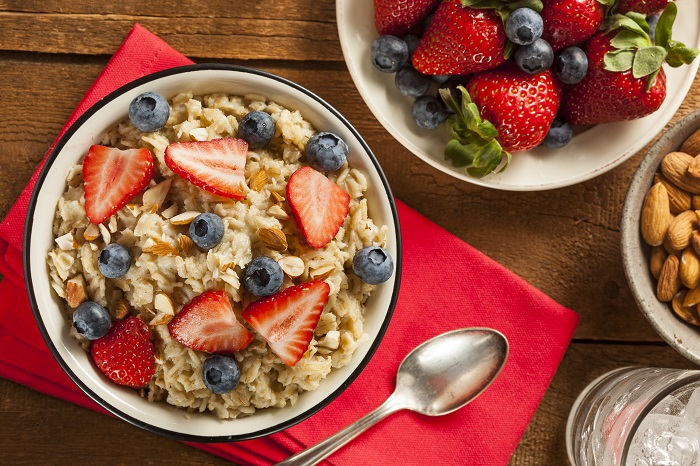Healthy Heart Talks
Nothing matters more than taking good care of your heart. Getting regular exercise, not smoking, and controlling stress are just a few things health experts recommend, along with eating a variety of nutritious, heart-healthy foods that make up a healthy diet.
Talking about healthy heart means talking about how you take care of your body as a whole. Eating the right kinds of food affects the whole system of your body especially your heart. Eating for a healthy heart means filling your plate with fruits and vegetables, paying attention to fiber, eating fish a couple times a week and limiting unhealthy fats like saturated and trans fats, as well as salt. And although no single food is a cure-all, certain foods have been shown to improve your heart health and these foods may help lower your risk of heart disease.
1. Oatmeal

Always start your day with a hearty and healthy breakfast. A steaming bowl of
oats, which are full of omega-3 fatty acids, folate, and potassium. This fiber-rich superfood can lower levels of LDL (or bad) cholesterol and help keep arteries clear.
2. Yogurt
Yogurt may protect against gum disease. Left unchecked, gum disease may elevate a person’s risk for heart disease. Researchers analyzed dietary intakes from nearly 1,000 adults and found those who consumed the highest levels of dairy—specifically yogurt and yogurt-type drinks—had the healthiest gums.
3. Salmon
Super-rich in omega-3 fatty acids, salmon can effectively reduce blood pressure and keep clotting at bay. Aim for two servings per week, which may reduce your risk of dying of a heart attack by up to one-third.
According to some cardiologists “Salmon contains the carotenoid astaxanthin, which is a very powerful antioxidant,” but be sure to choose wild salmon over farm-raised fish, which can be packed with insecticides, pesticides, and heavy metals.
4. Whole Grains
People who eat plenty of whole grains tend to be leaner and have a lower risk of heart disease than those who don’t. This is probably because whole grains contain antioxidants, phytoestrogens and phytosterols that are protective against coronary disease.
5. Nuts
Nuts are chock-full of vitamins, minerals, heart-healthy monounsaturated fats and low levels of saturated fats. Research suggests that people who eat nuts—walnuts, pecans, almonds, hazelnuts, pistachios, pine nuts and peanuts (which actually are legumes)—two to four days or more per week have a lower incidence of heart disease than people who eat them less often.
6. Olive oil
Italians loves olives, and uses olive oil for cooking. My husband is an Italian so I use olive oil in my cooking. Full of monounsaturated fats, olive oil lowers bad LDL cholesterol and reduces your risk of developing heart disease. Look for extra-virgin or virgin varieties—they’re the least processed—and use them instead of butter when cooking.
7. Berries
Blueberries, raspberries, strawberries—whatever berry you like best—are full of anti-inflammatories, which reduce your risk of heart disease and cancer.”Blackberries and blueberries are especially great, but all berries are great for your vascular health.”
8. Green Tea
Some of the strongest evidence of tea’s health benefits comes from studies of heart disease. Scientists have found that those who drink 12 ounces or more of tea a day are about half as likely to have a heart attack as non-tea drinkers.
Scientists also reported that people who drank a daily cup of green tea significantly lowered their risk of developing gum disease—the more tea, the lower the risk.
9. Soy
Soy may lower cholesterol, and since it is low in saturated fat, it’s still a great source of lean protein in a heart-healthy diet. Look for natural sources of soy, like edamame, tempeh, or organic silken tofu. And soy milk is a great addition to a bowl of oatmeal or whole-grain cereal.
10. Spinach
Spinach can help keep your ticker in top shape thanks to its stores of lutein, folate, potassium, and fiber. But upping your servings of any veggies is sure to give your heart a boost. Those who ate at least two-and-a-half servings of vegetables each day cut their risk of heart disease by about 25%, compared with those who didn’t eat the veggies. Each additional serving reduced risk by another 17%.